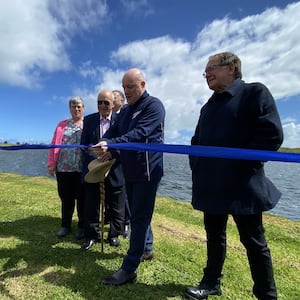Business
Business Leaders Call for Bipartisanship in Infrastructure Policy

Business leaders in New Zealand are advocating for increased bipartisanship in government policy-making, particularly regarding infrastructure development. They argue that true policy stability can only be achieved when both political parties recognize mutual benefits in their outcomes. This call for collaboration arises from a desire for long-term certainty and consistency in policies related to energy, water, and planning.
The demand for bipartisanship reflects a broader concern among businesses that have faced years of fluctuating government signals. According to Phil O’Reilly, a prominent voice in the business community, real policy stability is not simply a matter of politicians agreeing across party lines. Rather, it is achieved when both sides, motivated by their own interests, align towards similar objectives.
Understanding the Dynamics of Bipartisanship
O’Reilly’s experience at the intersection of business and politics suggests that what is often perceived as consensus is, in reality, a convergence of political self-interest. This phenomenon is an essential aspect of the political landscape, ensuring that different viewpoints can find common ground over time. He emphasizes that while true bipartisanship is infrequent, the resulting balance is beneficial for the country’s governance.
The ongoing debate revolves around how to foster an environment where evidence and engagement drive decision-making. Business leaders believe that effective infrastructure policies require a collaborative approach, which involves listening to diverse perspectives and considering the long-term implications of policy choices. The need for stability in infrastructure is critical, especially as the nation faces challenges related to climate change and urban development.
The Path Forward for Infrastructure Policy
For New Zealand to advance its infrastructure agenda, stakeholders must prioritize meaningful dialogue among political parties. It is essential that the government moves beyond mere calls for bipartisanship and instead focuses on creating a framework where all parties can engage constructively. By doing so, policymakers can ensure that infrastructure projects not only address current needs but also anticipate future demands.
In a landscape marked by rapid change, business leaders are urging politicians to look beyond short-term gains and work towards a shared vision for the future. This approach could lead to improved infrastructure that benefits all New Zealanders, fostering economic growth and enhancing quality of life.
As discussions around infrastructure policy continue, the emphasis must remain on collaboration and strategic alignment. Only through genuine engagement can the government create a sustainable and effective infrastructure framework that serves the interests of both the public and private sectors.
-

 World4 months ago
World4 months agoTest Your Knowledge: Take the Herald’s Afternoon Quiz Today
-

 Sports4 months ago
Sports4 months agoPM Faces Backlash from Fans During Netball Trophy Ceremony
-

 Lifestyle4 months ago
Lifestyle4 months agoDunedin Designers Win Top Award at Hokonui Fashion Event
-

 Entertainment4 months ago
Entertainment4 months agoExperience the Excitement of ‘Chief of War’ in Oʻahu
-

 Sports4 months ago
Sports4 months agoLiam Lawson Launches New Era for Racing Bulls with Strong Start
-

 World5 months ago
World5 months agoCoalition Forms to Preserve Māori Wards in Hawke’s Bay
-

 Health4 months ago
Health4 months agoWalking Faster Offers Major Health Benefits for Older Adults
-

 Lifestyle4 months ago
Lifestyle4 months agoDisney Fan Reveals Dress Code Tips for Park Visitors
-

 Politics4 months ago
Politics4 months agoScots Rally with Humor and Music to Protest Trump’s Visit
-

 Top Stories5 months ago
Top Stories5 months agoUK and India Finalize Trade Deal to Boost Economic Ties
-

 Health2 months ago
Health2 months agoRadio Host Jay-Jay Feeney’s Partner Secures Visa to Stay in NZ
-

 World5 months ago
World5 months agoHuntly Begins Water Pipe Flushing to Resolve Brown Water Issue









